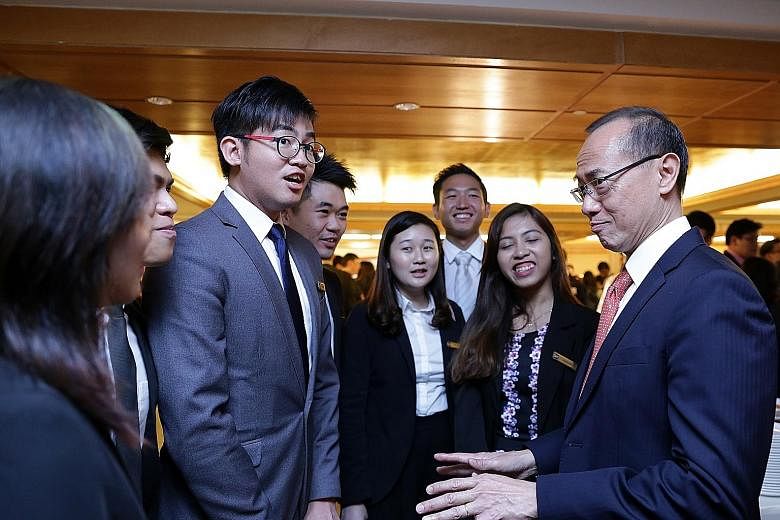Singapore's identity is complicated and multi-dimensional because of the country's geography and history, and this means Singaporeans will never be completely comfortable in how they see themselves.
But this reality - and the evolving Singapore culture - is worth celebrating, and may even be something the world needs, former foreign minister George Yeo said.
Speaking to 700 officials, diplomats, academics and students at the S. Rajaratnam Lecture organised by the Foreign Ministry's Diplomatic Academy yesterday, Mr Yeo said Singapore's destiny is in Southeast Asia, evident in how it is "the most Asean-ised country in Asean".
"Every of the other nine countries are fully represented in Singapore: We intermarry all of them, they are in our schools and universities, they have their little enclaves in Singapore, and we enjoy all their foods," said Mr Yeo, who is now chairman of Hong Kong logistics firm Kerry Logistics Network.
"The rich diversity of Asean is what makes Singapore what it is."
This is why Singapore is among the strongest advocates of Asean unity and integration, as the grouping's role as a neutral platform friendly to all major powers is irreplaceable, he added.
At the same time, Singapore's "Chineseness" is an inseparable part of its existence in South-east Asia, said Mr Yeo, a fact that has influenced various parts of its history, from many people's support of China in its war against Japan and the killing of many here in World War II, to Singapore being kept out of the Malayan Federation, its merger and then separation from Malaysia.
This part of the Singapore identity is an advantage with an ascendant China, but also complicates foreign policy in many ways, he noted.
He recalled how a senior Chinese diplomat told him there is "considerable mutual affection" between the peoples of China and Singapore.
"(But) the other side of this same emotional coin is that we sometimes overreact to disagreements," said Mr Yeo. "It's no longer a simple disagreement: It has an emotional connotation, which is a direct result of the relationship."
Singapore's ties with Malaysia and Indonesia are similarly fraught with emotional complications, he said. After 51 years, Singapore and Malaysia are still very much one people separated in two countries, while Indonesia's ethnic Chinese connection with Singapore complicates the bilateral relationship.
Singapore's links to India and the Muslim world are durable too, he said, citing many Indians feeling an affinity with the island, and Singapore religious students in Egypt.
This complicated identity means Singaporeans will always be arguing over a range of issues, said Mr Yeo, who added it is a good thing.
"It means that we are never completely comfortable within ourselves, we'll never stop worrying about it, and we'll never stop arguing over policies - affected by our multiple identities - whether it is education, or housing, language and culture, national security and foreign policy. The latest debate is on the elected presidency," he said.
"In having to grapple with these tensions, like an oyster with grit on the side which it cannot expel and which it has to accommodate, we develop a Singapore culture, a higher Singapore identity which is accommodating and inclusive, and always sensitive to race and language and religion."
He added that Singaporeans have come to accept these multiple identities, and learnt to be big-hearted, broad-minded and accommodating: "Being Singaporean means understanding and accepting diversity, and celebrating it. Singapore in the end is an idea worth living and fighting for, and an idea which the world desperately needs today, as globalisation has weakened hierarchies, resurfaced identities which are now all jumbled up in megacities.
"So the Singapore idea is a universal idea, and perhaps Singapore is only Singapore if it has this universal appeal," he added.


